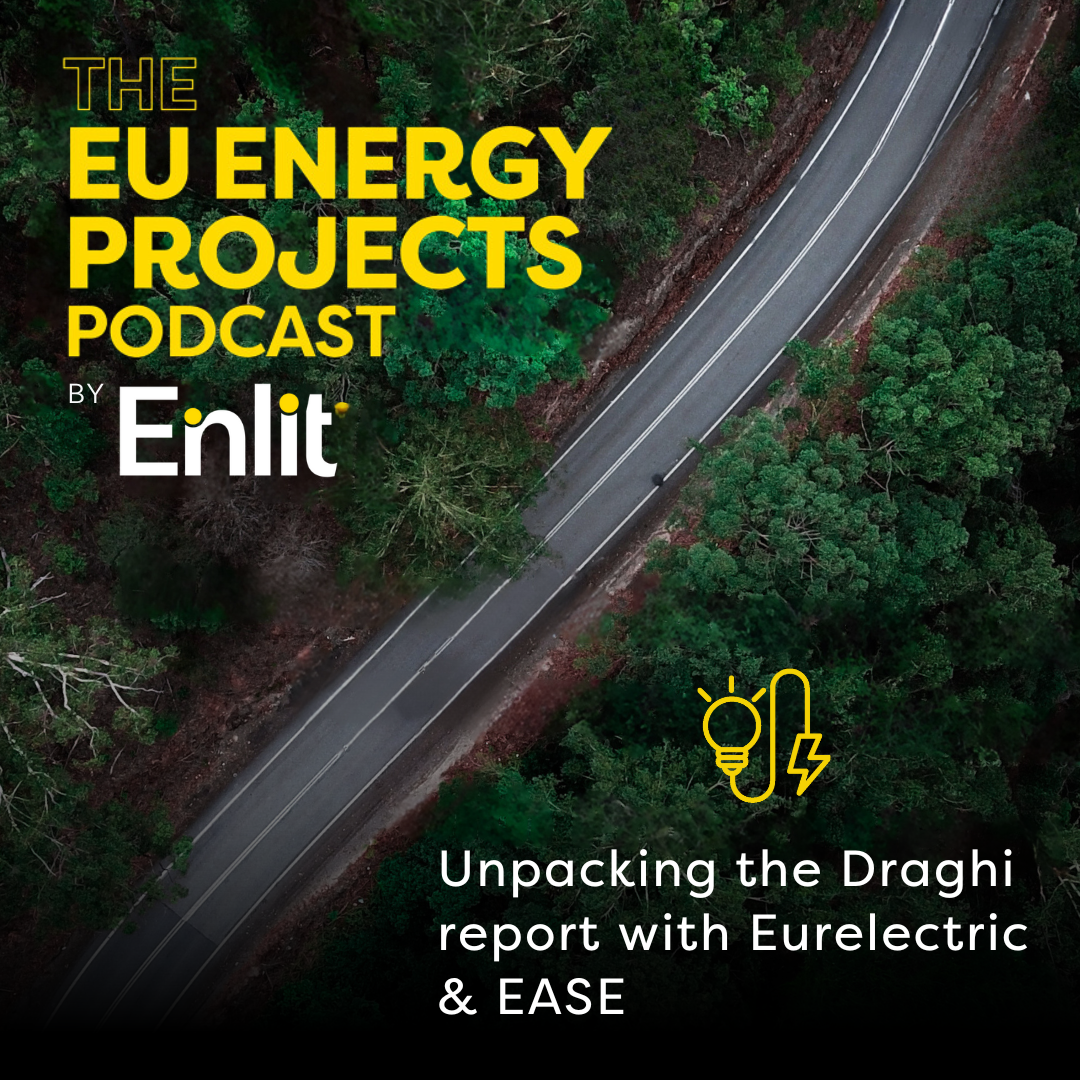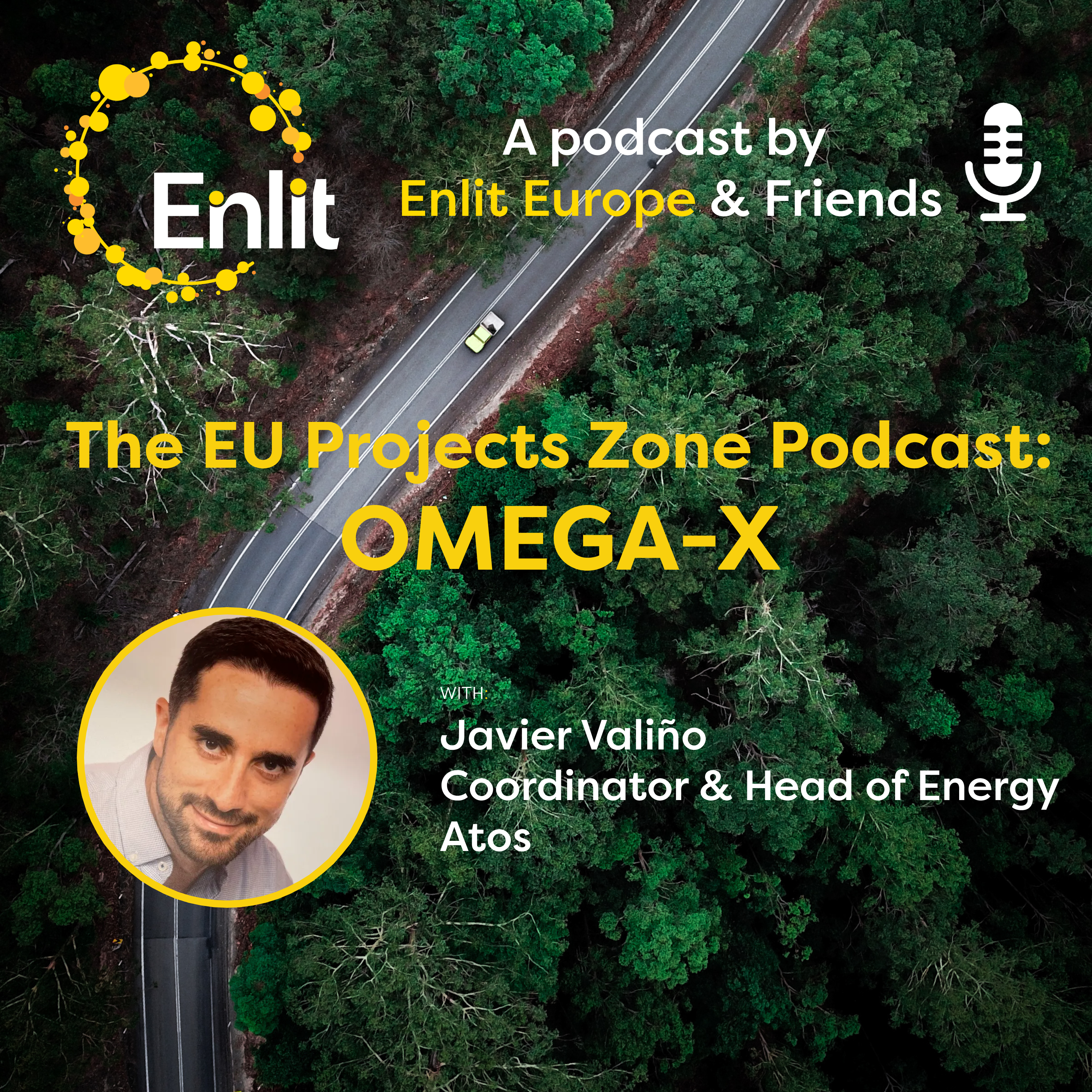Episode Transcript
[00:00:10] Speaker A: Welcome to the EU Energy Projects podcast, a podcast series from Enlighten France focusing on the clean energy transition for the European Union and the EU Commission funded energy projects that will help us achieve it. My name is Areti Daradimu. I am the editor of the EU Energy Projects podcast and your host.
In this episode of the EU Energy Projects podcast, we dive into Mario Draghi's report on the future of european competitiveness. Together with Christian Ruby, Secretary general of Euro Electric, and Patrick Clarence, Secretary General Oviz, we explore the impact of the report on the energy sector. In addition, key recommendations for improving infrastructure and investment, as well as discussing the crucial role the new EU Commissioner of energy will play in shaping Europe's clean energy transition. Gentlemen, thank you very much for joining us today. And could you please give me in bullet points, the most important points of drag is report according to you, Krishna?
[00:01:20] Speaker B: Yes, I would say that in a summary, the drag report sets out with a very thorough analysis the competitiveness challenge of Europe compared to the other major trading blocs, the US and China. And it then seeks to devise a number of solutions for how to reinforce and strengthen our competitiveness. The most important for us in the electricity sector is that Draghi very clearly identifies electrification as a key way to ensure, on the one hand, continued progress towards the decarbonization targets of the Green deal, and on the other hand, a reinforced competitiveness of Europe vis a vis the other major trading blocs.
[00:02:07] Speaker A: Patrick, do you agree?
[00:02:09] Speaker C: Yes, obviously I agree. I think it's a very well written report. And you see the two parts, the first part looking at really in the a, all the problems he identifies and then the solutions to it. So he's really trying to put a solutions on the table. He's not going to prioritizing them or saying which one we should do first. But that's fine. We have a commissioner who can look at this and choose and pick, but it is implementing, I would say, a better structure, a better european market. And he's trying to show that by having a better integrated also energy market, you increase the efficiency of the system and you reduce the cost of the system, what is a main driver. So I'm very much supportive of the points he identifies. He's also looking at other parts which are not strictly linked to energy, but will have an impact indirectly on energy, like the important project of common human interest he wants to put, and so on. So he's really going well into the details to make a better internal market and a better efficient market to reduce.
[00:03:10] Speaker A: The prices you mentioned already the new commission. How do you think these findings, the findings of this report will influence Oslo van der alliance policy decisions during her second term, if at all?
[00:03:23] Speaker C: First of all, I think it's not only Ursula, if you look at the energy part and we're talking now the energy part, we have the DG competition which is influencing this Digi Ener, DG environment, Digi Klima, but also taxation part. So we see a work together of the executive vice president Ribeira, who will work with Jurgensen, but also Roswell and Hoekstra. So you see there are different commissioners working together and they will very strongly push for an implementation of what was identified. Already we have identified European Green deal which needs to be declined in a more industrial compatible way. So we still need to continue to decarbonize, but we need to look how we can also take this competitiveness, this industrial development, research and development, and that's important for european projects, new technologies into this discussion.
[00:04:13] Speaker A: Christian, I would like also your comment on this and also could you elaborate a little bit if you think that this report and this new commission might actually mean that the Green deal will not be the priority that used to be the years before.
[00:04:30] Speaker B: Yeah. First, on the question of the potential role of the Draghi report in defining or shaping policy, I think there's no doubt that the Draghi report serves as a huge inspiration and to some extent also has been inspired and influenced by the commission. So there's no doubt that this is a document that will be carefully reflected in many of the policy proposals that will be set out. This is also clear from the mission letters that every single commissioner designate has received at this point in time. Every single one of these letters refers to the drage report. So we can expect this report and its analysis to really guide the formulation of policy. Now to your question, does this then mean that we have forgotten about the Green Deal? I think it's a very positive aspect of the Dragon report, that it very clearly identifies electrification as a way to unite the continued pursuit of green targets on the one hand, and improve competitiveness on the other hand. So whereas the policy objectives and priorities have shifted, they are now happening on the backdrop of the already made decisions on the Green deal. So it's not like we've forgotten about it. It's just already decided. And now it's about tackling the new challenges that have arised as a consequence of us doubling down on climate neutrality.
[00:06:04] Speaker A: Did you know that Enlit has another podcast? The Energy Transitions podcast is a broad ranging bi weekly podcast about the people accelerating the energy transition in Europe and beyond. You can find it on Spotify, Apple or wherever you enjoy your podcasts.
I've heard from many experts, let's say, especially people that work for utilities, one of them PPC in Greece. And I remember during the euro electric event in Greece last May, many people said that the new commission should for sure focus on competitiveness and that that might not be actually going hand in hand with the Green deal. So I do appreciate what you're saying and it makes sense. But there are a lot of voices that saying that if we want to be competitive, if we want to catch the train against the countries like China and the US, then perhaps we need to take a step back when it comes to the Green deal. Do you agree?
[00:07:05] Speaker B: Well, first of all, I would say that the way I know PPC, it's a company that's extremely committed to the green transition. In fact, over the last few years they have made a turnaround and very, very dramatically accelerated their pathway so that I believe today more than half of all generation in Greece is actually renewable. Secondly, I would say the analysis that we need act on the competitiveness of Europe and we need to act on ensuring that we continue to have a diversified industrial base is an objective that many of us share. We can all see that while decarbonizing is important, it would not be great to decarbonize by deindustrializing. We need to ensure sources of growth in Europe and hence we need to build a paradigm for competitiveness in the age of climate neutrality. That's really the task at hand. This is also where it becomes very complex because the green transition in itself will require massive investments on the one hand, and how do we, let's say, execute those investments while at the same time ensuring that we don't see power prices going through the roof. This is, in a nutshell, the political challenge and the industrial challenge we'll be facing in the coming years.
[00:08:29] Speaker A: Your comment, Patrick. And if you can also let us know the role of storage within this context.
[00:08:36] Speaker C: So we have seen in the last years that renewable is the cheapest generation source at hand. If you look at the merit order, it's the cheapest one because they have no fuels and costs. So getting renewables dispatchable and flexibility in the system will allow for very cheap electricity in the system. This is where we see no contradiction from the drug report to the European Green Deal. Also, the recommendations done in the drag report are following what was done in the European Green Deal or in the repoweru or other documents which followed, we see that the permitting, the self consumption, the integrated approach about the grids and the generation and all this which needs to be done in a more efficient way, was already mentioned, is repeated again in the drag report.
So the solution is to continue to facilitate the rollout and the investment in Europe, to give investment security and a long view with long power purchase agreements and a real clear structure where we go, but also by continuing to build on what we are good at, which means developing technologies, developing new technologies. We see that in energy storage, for example, there is a very cheap heat storage, it's very thermal storage is one of the cheapest solutions for storage. We see very established pump hydro storage. We see also the batteries prices went enormously down and the new chemistry evolved. So developing all these technologies, getting in the market, reducing therefore the cost for flexibility, which is one of the drivers, as long as we still contain a lot, as long as we still need to invest a lot in backup power plants. So getting this done will reduce the cost for electricity, which we needed to continue to keep the trust in this decarbonization and in order to be able to continue on this pathway.
[00:10:26] Speaker A: Draghi's report also highlights the need for more grid investments, because yes, renewables are the cheapest source of energy production, perhaps, but integrating them into the grid need some tweaks from various countries in a pan european perhaps level, in order to have flexibility in order to make our grid work in a productive way, let's say measures should EU member states adopt, according to you, to accelerate the deployment of infrastructure upgrades that are much, much needed. Christian, you first.
[00:11:02] Speaker C: Yeah.
[00:11:03] Speaker B: So I think the Dragon report correctly identifies grids as one of the key areas to really double down on, let's say, modernization of the system. With all the renewables coming online, it's essential that we also modernize the grid to, to make sure that we're able to integrate them. The most important thing we need to do here and now. I'm talking in relation to the so called distribution grids, which are the local grids where you connect a solar panel, where you will be charging your electric car, where you will be connecting your heat pump. Those grids need to be modernized as a matter of priority. 30% of them are already more than 40 years old, and they were made in a time for a very different system with centralized dispatch and a one way flow in the grid. Today, with all the new stuff coming online, the flows are more complex and we need to make sure that the grid is ready for that challenge. The most important thing we can do as society here is to plan for the longer term. We know that we're going towards climate neutrality some 25 years from now. That will imply a much more electric economy than the one we have today. Our cars, our heat pumps, et cetera, et cetera, will be electric. And rather than opening the streets every three years and being a hassle for all the citizens and the cities, we should make sure that we plan for the long term and that we build for the long term. So when we open the street today, we better put in some very thick cables that are able to carry this much more electric society 20 years from now. That means that we will have to put more money upfront. We will make bigger investments, but not very big because as a matter of fact, the cable we put in is only a small part of the investment. The real cost of modernizing grids is really the public works. So digging out the street and filling it up again. So planning and building for the long term, I think is really what I would like to have. Stick with the listeners here.
[00:13:16] Speaker A: Your comment Patrick on this we all.
[00:13:18] Speaker C: Agree that we cannot triple the renewables as we want to do by 2030 without a better grid infrastructure. The grid is the backbone, is allowing us to flow the electrons where we need them. And this grid needs therefore to, as Christian said, be adapted and a new role it needs to fulfill. But therefore we should also use new tools because if we see that the flow of electricity is changing and the lines which we build today will stay for another 50 years or 70 years, then maybe they will be less utilized or less adapted. So therefore a lot of alternatives exist today. They are called non wired alternatives to increase the network. Instead of building a new line, why don't I put a storage device somewhere in order to balance and use the existing line to 80 90% of its capacity? So you can reduce the cost to build a grid by using modern technologies which are researched also in all these u funded projects and shown to work. This is a driver we should do and ask question set we need to prepare the grid for the future so we cannot go for the permitting. The regulatory authorities cannot continue to only allow what is needed today. They must also allow the investment in what is needed in 20 years or 30 years so that we build it today and be ready when all these renewables hit. Because it's faster to build renewables or storage devices way faster than to build a new line.
[00:14:53] Speaker A: How might the recommendations in the report help Europe compete better in attracting investment for clean energy products, projects? And what will that mean for projects in general? Do you see a shift also, because project now projects and EU funded projects now have a tendency to play among new technologies?
Sorry, are they called community energy communities? Do you see a change in all that in the future?
Christian?
[00:15:24] Speaker B: Well, I think it's a bit early days to know exactly how this report will be transformed into action. But I do see a number of observations in the report that that should, let's say, impact the way that we work with projects that we work with european funding. One of the key observations in the report is that the EU money at EU level, if you will, is very scarce compared to the money that, for instance, the US has at federal level or China has at federal level. So we have much less to do with, and at the same time we're spending it on much more priorities. So a key part of becoming more competitive is to double down on fewer priorities, boost them more, and also make it easier for the companies to actually participate.
We hear time and again that the bureaucracy involved in making EU projects or participating in EU projects is way too comprehensive.
I heard one executive say, stay away from these projects unless we're talking about €100 million. Otherwise the trade off with the bureaucracy is not worth it. I hear from another stakeholder, look, the amount of bureaucracy we need to put in for a project of 50 million is exactly the same amount of bureaucracy that we need to perform for a project of 2 million. So there is a huge potential for efficiency by reducing or smartening up the bureaucracy. There's a huge potential for strengthening our strategic priorities by making more targeted use of the money. And then I think it's really a matter of, let's say, the general modus operandi, to see how it would make sense, especially for the participating companies to adopt and adapt the processes to make this happen.
[00:17:30] Speaker A: Patrik, your comment and building a little bit on my question and on Christian's answer, do you see also an opening for the private sector? Should EU funded projects be only EU funded or should the private sector intervene? Get there.
[00:17:48] Speaker C: Draghi mentioned in his report a tool which exists already. It's important projects of common european interest, IPCEIs, ipcays as you want to name it. Also, these projects exist today on societal relevant topics. We have this, for example, to ipcays on batteries, and they have the advantage of facilitating funding from member states. Given that we are single market, we need to adhere to rules when we subsidize our companies. And they have a very clear mandate and are allowed to increase national funding, member state funding on these projects and in these IPCIs you also have always a private investment happening. So by focusing as well the national funding and the company funding on projects of common european interest, and this for a number of projects which would help us to go forward in our decarbonization and electrification and integration of renewables, this is what will probably be looked at, because the drug advises to do so and it is built on the experiences we had with IPCIS and they're working quite well.
[00:19:07] Speaker A: My last question to both of you, if you could take one point out of the dragi report and take it to the commission and say this, you really need to integrate, what would it be?
[00:19:22] Speaker B: Well, I think the fundamental recommendation of electrifying the economy to a continue decarbonization and b reinforce competitiveness is the one piece that really needs to be delivered upon. The trick will be how to make that balance in a way where on the one hand the sector provides affordable energy for the energy intensive sectors in Europe, and on the other hand the sector remains investable.
That's really going to be the crux of this debate.
[00:19:55] Speaker C: Patrick, for you, I mean, obviously what Christian said is the biggest challenge. The way of integrating more innovation into the system is the part which needs to be looked at. We have this whole list of permitting and system coordination and promotion of innovation and all these points which are hampering existing technologies from entering the markets and getting the prices down fast. So we should continue on this path of integrating, of applying the voted legal text, the laws make them happen, give them the rights on the ground as it is stated in the documents, and allow for smooth implementation and integration of these technologies.
[00:20:51] Speaker A: Patrick, how do you think we can accelerate the adoption of EU project findings?
[00:20:57] Speaker C: The drag report wants to foster innovation in the energy sector by focusing on key technologies in order to deliver more affordable energy to reach a greater scale.
We see that the low cost of technologies like in the thermal storage or as you see other technologies emerging which are demonstrated, help to reduce the cost of electricity, of integrating renewable, of providing flexibility. So continuing this research and the innovation which was mentioned in the report, with just the technology and the uptake by the markets and by focusing, as I said, on key technologies which are needed there, will facilitate the decarbonization integration.
[00:21:45] Speaker A: Thank you both very much.
You've been listening to the EU Energy Projects podcast, a podcast brought to you by enlit and friends. You can find us on Spotify, apple and the enlit World website. Just hit subscribe and you can access our other episodes too. I'm Areti Daradimo. Thank you for joining us.




